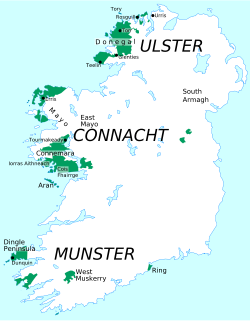New Study Suggests Irish Government in Conspiracy Against the Irish Language – Dublin’s Largely Mono-lingual English-Speaking Elite Stand Accused
The fate of the Irish language is, at this time, in the hands of a Government that is failing to protect Ireland’s culture. There are bad governments and good governments. Ireland’s Fine Gael/Labour administration falls into the bad category, particularly when it comes to the health of the Irish language. The problem is that the present Irish government has the ability to seriously damage the Irish language before they are consigned to history. – Transceltic’s Eibhlin O’Neill
Dr Conchúr Ó Giollagáin, author of a recent study on the impact of the Irish Governments indifference to the survival of the Gaeltacht (Irish speaking areas) has echoed similar comments made by Seán Ó Cuirreáin, Ireland's First Language Commissioner who resigned in early 2014 in protest of the current government’s failure to support the Irish tongue. In an interview with Transceltic at the time of his resignation, Mr Ó Cuirreáin stated in reference to state staff in pivotal poisitions impacting the Celtic tongue: “While there are many who are favorable to Irish and concerned about the language’s future, there are many, many more who simply regard anything to do with Irish as a thorn in the administrative side.”
Dr Ó Giollagáin is Gaelic Research Professor at the University of the Highlands and Islands and Director of Soillse, the National Research Network for the Maintenance and Revitalisation of Gaelic Language and Culture. Dr Ó Giollagáin collaborated with a team from Soillse in a recent study which is an update to a 2007 paper entitled “Comprehensive Linguistic Study of the Use of Irish in the Gaeltacht”. When published 8 years ago the original study outlined recommendations to strengthen the Irish language with particular emphasis on the preservation of the Gaeltacht (Irish speaking areas). See the link to the original study below.
The Update to the 2007 Study cites the traitorous neglect of the Irish language by the current Government. In an article in the Irish Times, Ó Giollagáin is quoted as follows: “…the State is perceived (by Irish Speakers) as obstructing the strategic deployment of the mechanisms of State against the clearly documented crisis in Irish-speaking networks…. (the government’s) strategy is devoid of analytical foundation, diagnostic rigour or strategic relevance… evasiveness (on the part of the Irish Government) has engendered a form of passive aggression in official circles towards the crisis in the Gaeltacht, which is taking on the hallmarks of a conspiracy…. Those working for the language agencies (within the Irish Government) operate as an intermediary class between the State’s largely mono-lingual English-speaking power elite and the bilingualised Gaeltacht, rather than as dynamic leaders of a distressed community.”
Dr Ó Giollagáin received his PhD in Modern Irish from University College Dublin and lectured in the department of Irish at St. Patrick’s College, Dublin City University, and in the department of Celtic studies at the Catholic University of Lublin, Poland. He co-authored the government-commissioned Gaeltacht survey " Comprehensive Linguistic Study of the Use of Irish in the Gaeltacht (2007)". Dr Ó Giollagáin is also an external fellow of the National Institute for Regional and Spatial Analysis at the National University of Ireland, Maynooth, where he has contributed to a variety of research projects examining different aspects of the language dynamics and linguistic anthropology of minority language culture.
In the Febraury 2014 interview with Transceltic, Seán Ó Cuirreáin, Ireland's First Language Commissioner, sadly had reached the same conclusion: “ If you regard public administration as having two sides – the elected political masters who should decide on policy and the executive or administrative element (civil or public servants) who implement it, I was suggesting that there is a large cohort of people within the state sector (mainly senior civil servants) for whom the language has no importance nor is it anywhere on their agenda. The politicians are generally favorable towards the language but very often too caught up with what they would see as more important issues (such as the economy, finances, etc). The civil servants, occasionally referred to as the permanent government, hold much sway and can set the agenda in their own way. While there are many who are favorable to Irish and concerned about the language’s future, there are many, many more who simply regard anything to do with Irish as a thorn in the administrative side. The culture of any organization seeps down from the actions of those at the top and if the view from above is that the language is not important this sets the trend and agenda with state agencies staff.”
Mission Statement of Soillse, the Gaelic Sociolinguistic Research Network:
1. An international-quality research capability that will support, inform and influence policy at national and local levels in the effort to maintain and revitalise the Gaelic language in Scotland and beyond.
2. A powerful research network across the participating Scottish Higher Education Institutions, linking national researchers with expertise and interest in contemporary Gaelic language matters, with international minority language research institutions.


Map of Gaeltacht, the Irish-Speaking areas of Ireland. Image courtesy of Wikipedia.
http://www.transceltic.com/blog/warning-irish-government-bad-health-of-y...
http://www.transceltic.com/irish/fight-save-irish-language-exclusive-int...
http://www.udaras.ie/en/nuacht/tastail-a/
http://www.ahg.gov.ie/en/20-YearStrategyfortheIrishLanguage2010-2030/Pub...(summary).pdf
http://www.irishtimes.com/opinion/irish-in-crisis-we-need-a-new-deal-to-...
- Emmett McIntyre's blog
- Log in to post comments






